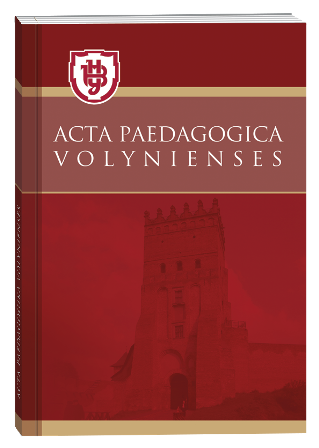MATHEMATICS EDUCATION IN THE CONDITIONS OF DIGITALIZATION OF SOCIETY
DOI:
https://doi.org/10.32782/apv/2023.4.15Keywords:
digitization of education, artificial intelligence, learning mathematics, development of thinkingAbstract
The directions of using digital technologies to improve the educational process are analyzed. In particular, ways of using information and communication technologies during the study of mathematics in institutions of general secondary education are highlighted. The advantages of using digital technologies in education and the disadvantages that may arise during the implementation of information and communication technologies in the educational process are considered. The risks that will arise in connection with the unlimited development and spread of artificial intelligence are highlighted, and ways to improve the process of teaching mathematics to overcome these risks are proposed. The factors that arose in connection with the growing role of artificial intelligence in the modern world and determine the need to change the paradigm of the educational process are taken into account. The main approaches to the organization of mathematics education in order to develop the thinking of schoolchildren are characterized. This will help students better understand the object of research, understand mathematical concepts and how to apply them in practice. The purpose of the article: to analyze the impact of digital technologies on the organization of the educational process, to highlight the challenges that the intensive introduction of artificial intelligence brings to the process of teaching mathematics, and to indicate ways to overcome them. Methodology: analysis of scientific works on the state of digital transformation of education in Ukraine, systematization of the obtained results, forecasting the result of the impact of artificial intelligence on the development of society, development of recommendations for improving the components of the methodical system of teaching mathematics in institutions of general secondary education. Scientific novelty: the ways of modernization of mathematics education in conditions of intensive digitalization of society are highlighted. Conclusions: under conditions of intensive development of digital technologies and machine intelligence, there is a need to improve the content, forms and methods of education, with the aim of forming the younger generation the skills they need for a competitive advantage in the labor market.
References
Alhumaid, K., Naqbi, S., Elsori, D. & Mansoori, M. (2023). The adoption of artificial intelligence applications in education. International Journal of Data and Network Science, 7(1), 457–466. URL: https://www.growingscience.com/ijds/Vol7/ijdns_2022_115.pdf.
Adrian F. Ward, Kristen Duke, Ayelet Gneezy. BosBrain Drain: The Mere Presence of One’s Own Smartphone Reduces Available Cognitive Capacity. Journal of the Association for Consumer Research 2, № 2 (April 2017). URL: https://www.journals.uchicago.edu/doi/full/10.1086/691462
Биков В.Ю. Суспільство знань і освіта 4.0 // Освіта для майбутнього у світлі викликів ХХІ століття (польська, EDUKACJA W KONTEKŚCIE ZMIAN CYWILIZACYJNYCH). – Bydgoszcz : Widawnictwo Uniwersytetu Kazimierza Wielkiego, 2017. – С. 30–45. https://lib.iitta.gov.ua/708567/1/%D0%91%D0%B8%D0%BA%D0%BE%D0%B2%20%D0%92_%D1%81%D1%82%D0%B0%D1%82%D1%82%D1%8F2017.pdf
Духаніна, Н. М., Лесик Г.В. Цифровізація освітнього процесу: проблеми та перспективи. The 12th International scientific and practical conference “Modern directions of scientific research development” (May 18–20, 2022), Chicago, USA. – Chicago : BoScience Publisher, 2022. – P. 406–409.
Елькін О. Віртуальне вчительство: чи замінить штучний інтелект людей у школах? 2023. URL: https://nus.org.ua/view/virtualne-vchytelstvo-chy-zaminyt-shtuchnyj-intelekt-lyudej-u-shkolah/
Louis-Philippe Beland, Richard Murphy. Ill Communication: Technology, Distraction & Student Performance, CEP Discussion Papers № 1350, Centre for Economic Performance, LSE, 2015.
Мар’єнко, М., Коваленко, В. Штучний інтелект та відкрита наука в освіті. Фізико-математична освіта, 38(1), 48–53. Режим доступу: https://doi.org/10.31110/2413-1571-2023-038-1-007
Сисоєва С. Цифровізація освіти: педагогічні пріоритети. Режим доступу: https://naps.gov.ua/ua/press/about_us/2545/
Смаль К. Цифрова трансформація освітнього процесу. Режим доступу: chrome-extension://efaidnbmnnnibpcajpcglclefindmkaj/http://dspace.pdpu.edu.ua/bitstream/123456789/16288/1/%D0%A1ifrova%20transformaciya%20osvitnogo%20procesu.pdf
OECD, Students, Computers and Learning: Making the Connection, PISA, OECD Publishing, Paris, 2015. URL: https://doi.org/10.1787/9789264239555-en.
Уманська Г. О. Застосування комп’ютерних технологій у навчальному процесі // Математика в школах України, 2009, № 4, С. 2–4.







